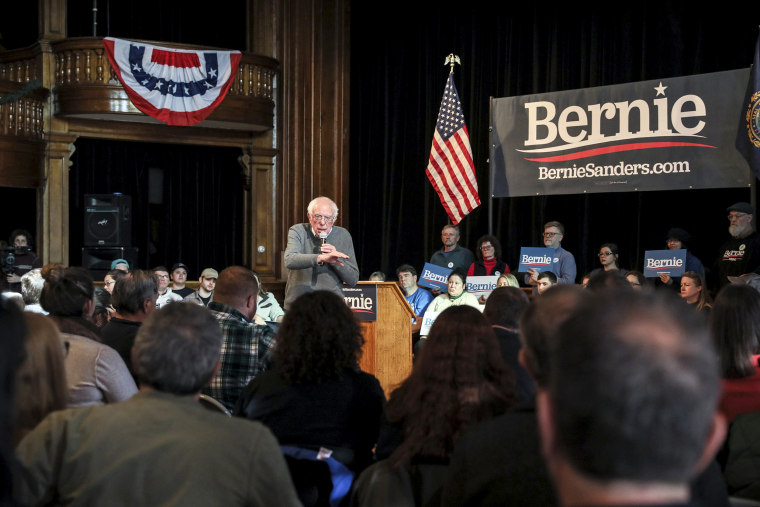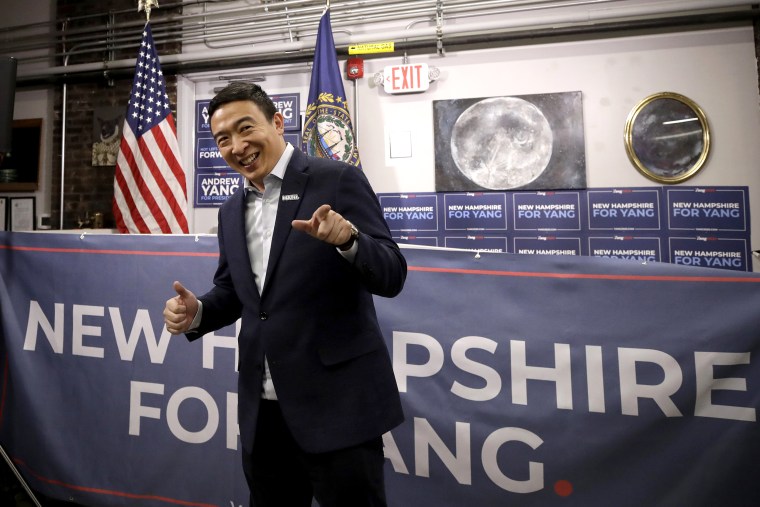NASHUA, N.H. — During a Des Moines campaign stop last August, Andrew Yang stood on a small stage and declared himself the “younger, fresher, more modern, more Asian version of Bernie.”
Five months later, the entrepreneur and presidential candidate has stopped directly comparing himself to Sen. Bernie Sanders, I-Vt., in his stump speeches, but some voters in New Hampshire are still comparing the two candidates as they decide whom to vote for in the critical first-in-the-nation primary.
"I trust Bernie, I think that he’d be great,” Kelly O’Brien, 29, said at a Yang campaign stop in Nashua. “However, I would also like to see someone new, someone to revitalize young people."
"If Sanders has a problem in New Hampshire, I think it's a Yang problem,” said Dante Scala, a political science professor the University of New Hampshire's Carsey School of Public Policy and a local demographics expert. "Every young voter Yang takes, I think you could make a good case it’s a Sanders voter."
Sanders easily won the state’s primary in 2016 with 60 percent of the vote, thanks in large part to a coalition of young people, independents, and voters looking outside the establishment. Based on interviews conducted at dozens of events held over the past few months, Yang is attracting the same types of voters at his campaign stops.
According to the RealClearPolitics polling average, Sanders holds only a slight lead in the Granite State over former Vice President Joe Biden, with 22.5 percent and 21 percent of support respectively. Yang is only polling at 3.3 percent there, but in a primary with a close race at the top, every vote counts.
Unlike in the Iowa caucuses, where supporters of candidates who fail to reach 15 percent support have to realign with a second choice, voters in New Hampshire get one shot to show their preference.

Brandon Laws, an elected Nashua alderman, has been a fan of Sanders for a decade and was among his early local 2020 endorsers back in May. But, he told NBC News, he is now "un-endorsing" him to instead throw his support behind Yang, in part, because of the latter's idea of a universal basic income.
"Andrew Yang is talking about things that are existential threats that if we don’t start addressing them actively with comprehensive solutions, I think it’s going to be too late,” he said, adding he would still be “elated” if Sanders ultimately won.
Yang, who supported Sanders himself in 2016, has described the Vermont senator as a "hero" and "a role model." But while the two candidates share the same outsider appeal and some similar policies, Yang has said that his fresh perspective on economic issues makes him a compelling candidate.
"I think that though we're aligned on some of the same goals, I think I have some more modern approaches that would be more effective at reaching those goals," Yang said after the November debate in Atlanta.
Both Yang and Sanders pitch themselves as outsiders with plans for big, systemic change. Sanders has built a base with his "Medicare for All" and Green New Deal plans; Yang’s platform is built around the idea of universal basic income.
The similarities don't end there. Both candidates are known for their rabid online fanbases. They're both big basketball fans. The Yang campaign even nabbed the media firm that helped Sanders raise his profile in the last cycle.
“The fact that it's the team that had worked with Bernie last time certainly made it seem like there was a natural fit,” Yang said when the campaign hired Devine Mulvey Longabaugh, adding he hoped they “can approximate that kind of magic” with his campaign.
“I think our experience in the 2015-16 campaign gave us sort of an understanding of the discontent out there among American voters, and certainly inside of the Democratic Party – working-class, middle-class voters just think this economy hasn't been working for them and isn't working for them,” media consultant Mark Longabaugh said.
But Sanders campaign manager Faiz Shakir is confident voters will trust Sanders as the candidate who can beat President Donald Trump and make change happen.
“Andrew Yang is talking about solutions for a working class that is struggling,” he said. “And the candidate, Sen. Sanders, understands that people are going to be interested in different messages and new approaches to these problems, but we feel comfortable that they'll come home when it comes time to vote.”
Another staffer echoed Shakir’s sentiment.
"Broadly speaking, we are not concerned,” a member of the Sanders campaign told NBC News. "We feel really good about the work that we've done with these communities," referring to its organizing outreach to young people and independent voters.
Yang’s campaign was quick to note that their candidate is not pulling support exclusively from Sanders, as evidenced in his latest swing through the state where he is seeing more "Yang-curious" voters who are considering several different candidates rather than solely die-hard supporters. The candidate is also taking more risks in booking bigger venues.
“We certainly from a strategic and messaging standpoint have not set this up as a bipolar competition,” Longabaugh said, noting a new generation overlap with former South Bend, Indiana, Mayor Pete Buttigieg, big idea crossover with Sen. Elizabeth Warren, and electability over Trump akin to Biden.
“They’re taking advantage of their resources to build beyond their initial niche,” Scala said. "But I would still argue his first real leverage among the electorate was among the younger voter. Now it’s whether he can expand that."
Yang has held more than a hundred campaign events in New Hampshire since 2019, doubling Sanders’ total, and in recent months has expanded his field effort to include 10 offices and 40 staffers across the state — figures rivaling and even surpassing some of the leading candidates.
But field organizers have dwindling days to convince New Hampshire voters ahead of the Feb. 11 primary — the most important ones are between the Iowa caucuses and voting day.
“The media roar in that week between Iowa and New Hampshire is so loud. Despite the fact that he’s run a good campaign, it could be easy for him to become a backstory,” Scala said.
For now, some voters are giving the new guy a chance.
Anne Lennon, 55, voted for Sanders in 2016 but is now sold on Yang after seeing him in her hometown.
“I just feel like he’s very in touch with the state of the country. He understood why Trump won,” she said. “I feel [Sanders] is too old, but I think he’s an amazing resource -- he’s that grandpa we could turn to.”
Her daughter Catriona Lennon, 21, backed Sanders' last cycle but is undecided this time around — though she also thinks Sanders is “past his prime.”
“It would be beyond incredible to have another person of color in the White House,” she said of Yang.
Laws, Yang’s latest local endorser, is uncertain of his new candidate’s chances at the nomination but hopes Yang gets enough support for his message to gain traction.
“That’s one of the ironies of me switching my support from Bernie to Yang in the primary,” Laws said.
“I think Yang is the 2020 equivalent of what Bernie Sanders was in 2016, in the way that the things people were saying about ‘pie in the sky’ ideas from Bernie four years ago, now that’s the standard for most of the people running for the Democratic nomination.”
